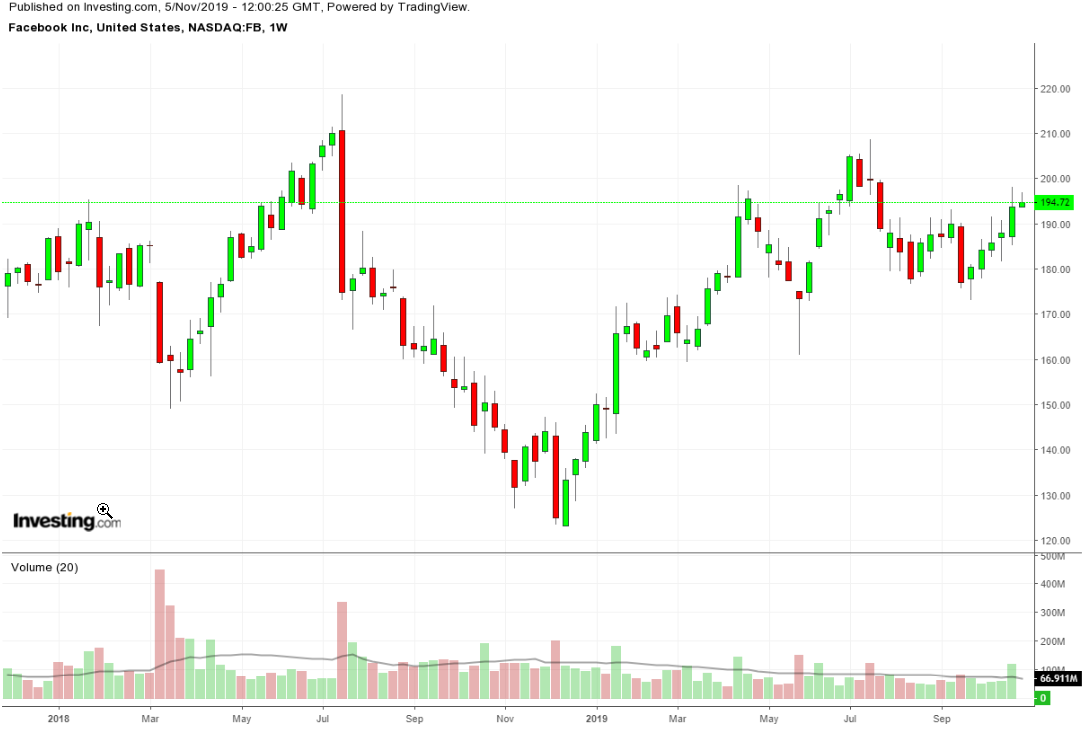For the past fifteen months, Facebook (NASDAQ:FB) shares have been virtually stuck in place. Formerly a market darling, the social media giant's stock is up just 3.6% over that timeframe, significantly trailing the S&P 500’s performance of 8.6% during the same period.

Facebook’s current price of $194, is the same as it was in January 2018, with the stock largely trading sideways since then.
Even after its strong revenue beat during last week's quarterly earnings report, Facebook shares still seem to be going nowhere. Since the stock started trading publicly in 2012, it has never been entrenched at the same price for two years, something it's now dangerously close to doing. If the business is so good, what then has gone wrong?
Indeed, the company's numbers continue to power higher: revenue in Q3 was $17.6 billion, 29% higher than a year prior. Earnings came in at $2.12 per share, 20% more than the same quarter last year. Though the price of its shares jumped after earnings, reaching $198, they promptly fell back to $193 afterward.
The problem then for Facebook isn't about profitability. Rather, it's about perception: investor sentiment has simply soured on what the company does and what it stands for.
That's because the social media colossus has been in the spotlight on two fronts at the same time, fighting two critical battles that could each have significant impact on the company and its stock.
Politics, Bias and Banned Advertising
Since the 2016 U.S. presidential election, Facebook has involuntarily become a political 'player,' after accusations surfaced that the social media platform was instrumental in helping Russia sway the process—and possibly the results. As well, Democrats believe Facebook is biased against them while Republicans are convinced they're being discriminated against.
Facebook is stuck between both sides, without any possibility of convincing either end of the spectrum they're incorrect. Of course, this particular problem isn't exclusive to Facebook; Twitter (NYSE:TWTR) and Google (NASDAQ:GOOGL) have been accused of this as well.
U.S. Congressional hearings during September 2018 and in April 2019 on the subject introduced the possibility of tougher regulatory scrutiny hitting Facebook and other social media platforms, spooking investors. Plus it doesn't help that Twitter recently announced it would ban all political advertising from its platform whereas Facebook said it wouldn't even fact-check political ads posted to its site.
Becoming the center of a heated political debate in which you're accused of wrongdoing by literally everyone is not a great way to drive sales.
Increasing Power, Additional User Data
If all this wasn't enough, Facebook heralding the idea of a proprietary cryptocurrency, Libra, hasn't been a public relations masterstroke either.
With mounting calls from the public and global governments to limit Facebook’s power given the volume of user data it already collects—which has been accelerating since news broke in 2018 of the Cambridge Analytica data breach—developing yet another platform from which to extract even more user information, this time on financials, seems like a corporate misstep. Not to mention a sure way to antagonize governments.
Indeed, in late October, Congress held another hearing in which CEO Mark Zuckerberg discussed his plans for the Libra project. But reading between the lines, this session was actually more about how by developing a corporate-backed cryptocurrency, Facebook would be infringing on global central banks and obstructing government power to control fiat currencies, as well as the role stablecoins should take within the U.S. economy.
The Libra project seems all but dead at this point. Marquee partners, including Mastercard (NYSE:MA), Visa (NYSE:V), Stripe and PayPal (NASDAQ:PYPL) have all backed out. It would be smart for Facebook to indicate they're rethinking the premise without killing it entirely. Done strategically, this would be both good for PR while also allowing the pressure from U.S. and international government regulators to ease.
What Happens Next?
Can Facebook pull back from the spotlight sufficiently and get back to the business it does best, sidestepping the full force of government scrutiny and repair its reputation? Probably.
Though it's currently taking the brunt of the regulatory heat aimed at social media in general, any legislation is unlikely to discriminate against Facebook alone. In a worst-case scenario, the regulatory environment becomes unduly harsh, affecting the way the company does business today. This would pressure revenue and probably make future business ventures more prohibative.
Still, social media isn’t going to disappear. And given Facebook's broad reach along with the depth of its coffers, the company would likely still be able to gain a strong advantage over competitors no matter how heavy-handed lawmakers might become.
Plus, as the acknowledged leader in its segment, Facebook is better equipped than its peers to handle changes. It has, after all, showcased time and again its ability to effectively monetize its platforms.
In addition, too-harsh regulation could thin out the competition, which would likely spur internal innovation while driving yet more users to Facebook’s platforms, boosting the company's market share. For proof, this is precisely what happened when Europe’s GDPR regulation was levied against online advertisers in mid-2018. The law led to Facebook and Google (NASDAQ:GOOGL) having more relative power, rather than less.
The more important question, arguably, is when will the controversy die down? This, of course, is harder to project. It could, unfortunately, last a year or a longer, if Facebook doesn’t willingly slip back into the spotlight in some other way.
Nevertheless, users continue to flock to Facebook. It now has 2.4 billion monthly active users, 31% of the entire world population. Even with negative PR and increased regulatory scrutiny, long-term, those statistics remain difficult to bet against.
